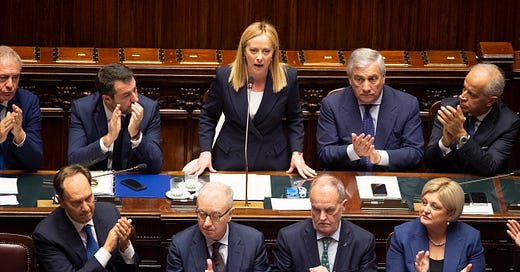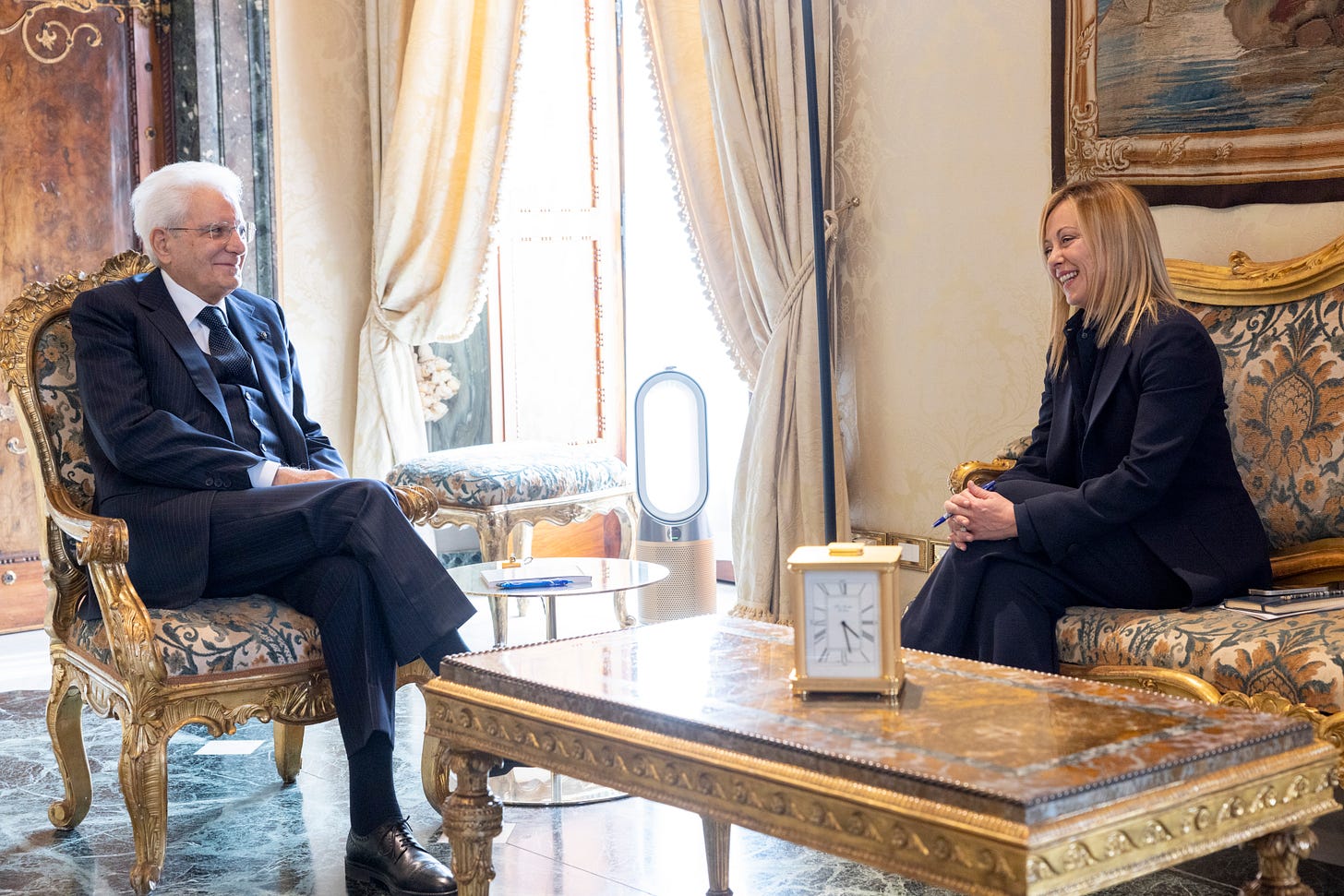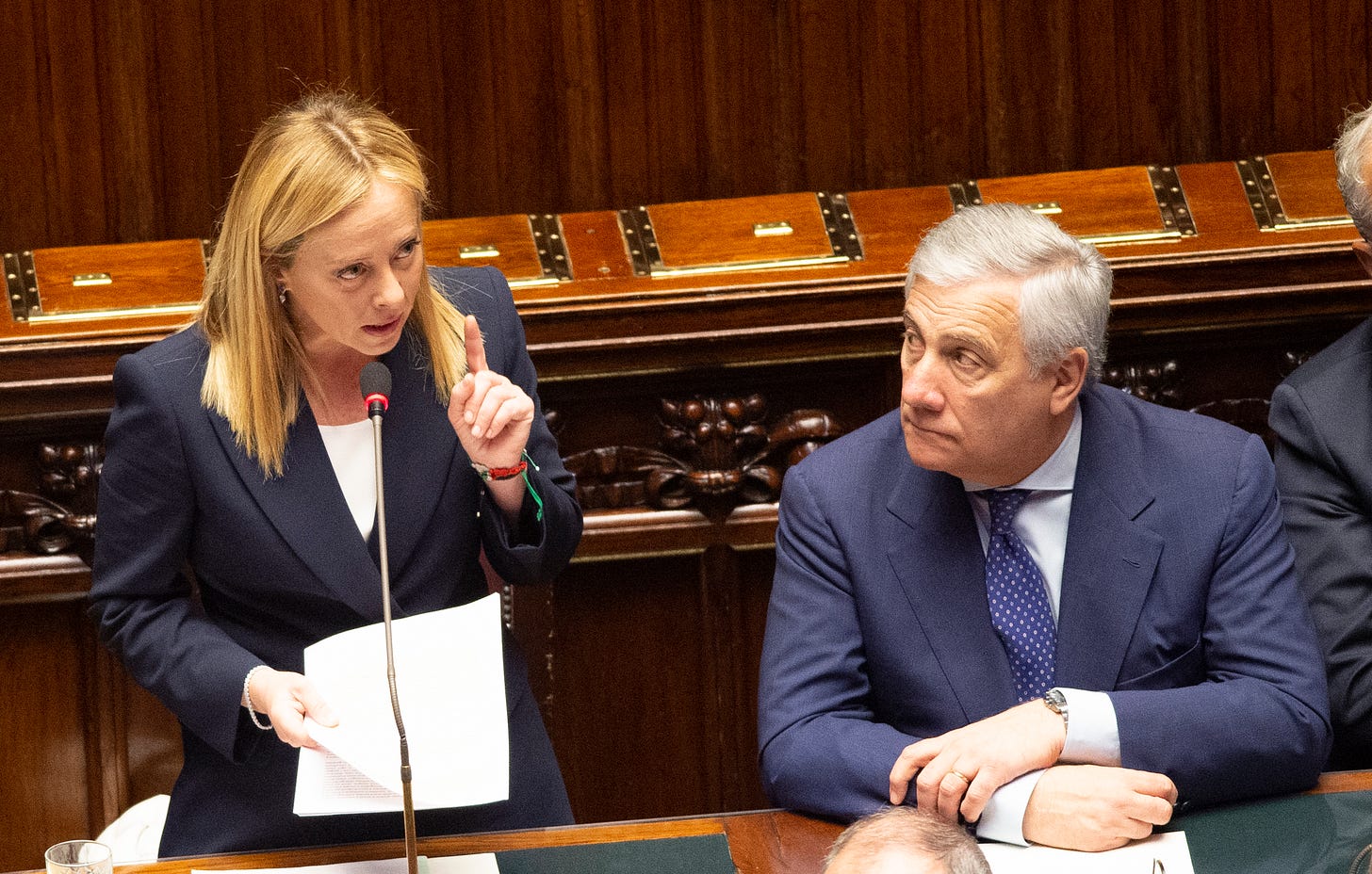Meloni's Government: a smooth handover of power and a rhetoric speech marking the beginning of her mandate
As I said in the last episode, Meloni's future didn't seem so bright as problems popped up one day after another. But she showed leadership to deal with them – something we haven't seen in a long time, as clashes between leaders tended to create more internal divisions and nothing sorted.
Infights in the coalition reached a tipping point after the publication of Berlusconi's note, leading to Meloni's hard comment. The gap between the two leaders appeared unbridgeable, but they could find an agreement after Berlusconi's "pilgrimage" to Meloni's party office building in Rome. Many commentators noticed that in the past, it was Meloni going to one of Berlusconi's villas, while after the election, it was the opposite. Despite Berlusconi's effort to still have a say, the election outcome is clear, with Meloni holding power – and responsibility.
As soon as they reached an agreement, Berlusconi created another scandal. LaPresse published a recording where it is possible to clearly hear that Berlusconi blames Zelensky for forcing Putin to invade Ukraine. On top of that, he said he is one of the Putin's five real friends, and they exchange gifts and thoughtful letters for their birthdays. A statement from Berlusconi's Forza Italia party tried to play down the comments by declaring that it was an old story Berlusconi was telling to the other MPS. But the damage was done, putting in question the future geopolitical position of Meloni's Government.
A concern that has reason to exist as two of the three leaders in the right-wing coalition, Berlusconi and Salvini, showed pro-Putin feelings in the past. In contrast, Meloni worked to detach herself from Putin. Indeed, this could be the right moment for the right-wing politicians in Italy to clear out their ambiguity towards Putin. However, Meloni promptly stated that Italy would remain aligned with its NATO allies at the cost of having no government.
She showed political leadership, and in spite of the internal cracks, the coalition went as a united front for the talks with President Sergio Mattarella. He gave her the duty to form a government, and she accepted without reserve. On the 22nd of October, Meloni swore as the first Italian woman prime minister - we could have different views, but it's fair to say it's a historical moment.
She could indeed do more to reduce the gender gap existing in Italy with a little step, such as using the female article la to call herself prime minister – in Italian, in most cases, the article gives the gender, and she wanted to be called Il premier instead of the La premier. It's also telling that only six women out of 24 ministers are in the cabinet.
But hopefully, one day, it will come that moment too.
We can finally see the composition of the new cabinet with nine ministers from Fratelli d'Italia, five Forza Italia, five Lega Nord and five technicians. It was expected that Fratelli d'Italia had most of the seats, and despite the technical figures, it's a political government. Also, it's important to outline that it's the first time in decades that there is a government with an explicit political ideology: right-wing with – hopefully – a clear vision to take off. Whether this will be successful or a complete disaster, time will tell.
Another remark is that Meloni appointed Salvini as Minister of Sustainable Infrastructures and Mobility and not as Home Office as he demanded. Likewise, she didn't meet all of Berlusconi's requests as she didn't appoint the former Senate Speaker Casellati as Minister of Justice. So, it looks like she isn't willing to give her allies too much room to undermine her leadership.
The handover of power with Draghi was smooth, with a long meeting where Draghi passed over a report about the future challenges ahead. This is a positive as it gives a base from where Meloni could keep going given the future strict deadlines.
A short comment about Meloni's maiden speech
The emotion was evident in Giorgia Meloni's voice as she started to speak as the first woman Prime Minister in the parliament. But she is used to public speaking, and a few seconds later, she was at ease addressing the Chamber of Deputies and the Senate on the Government's next five years programme. In the speech, she stated she had never sympathised with any anti-democratic system, fascism included, and that 1938 – promulgation of the racial laws – was the lowest point in Italy's history.
Towards the EU, she outlined the importance of effective integration to face the current challenges that a single state couldn't deal with. At the same time, to be united in diversity and respect those who raise "questions" when something isn't working. Cooperation with the EU it's also important to manage the immigration flows from North Africa. She doesn't talk anymore about the naval blockade – as during the campaign – but to create hotspots run by international organisations to check whether people have the requirements to come to the EU or not. Specifically, she named only those who flee from wars or oppression. She didn’t include the environmental migrants – those who have to leave their homes because of climate change –climate change doesn't seem to be a pressing issue in her plan.
More urgent is the energy crisis as it will force the Government to postpone some reforms – such as flat tax – promised during the campaign as the resources will be allocated to ease the costs for businesses and households. Probably, this crisis will be used as an excuse to attempt to negotiate with Brussels to adapt Italy's Next Generation Eu to the current situation. Apart from this, she hasn't stated any plan to address the crisis yet.
However, she confirmed Italy's geopolitical position as a NATO member ally and supported Ukraine. But she still needs to clear out how this support will be.
The final part of her speech was like she was going to war with a solemn tone, saying she won't back off, throw the towel, or betray.
One of the comments I often hear about Meloni is that she is consistent. But the character of Meloni as the opposition leader, who constantly shouts and attacks her opponents, seems gone. We have seen a more diplomatic Meloni who changed her tone towards the EU because she knows that going against it would inflict self-harm on her Government.
Her speech is full of rhetoric for her ambitious plan to change this country, similar to other plans set out from the same seat. But five years is a long time.
Will her Government survive?
What is sure for now is that she has a safe play as long as the opposition keeps being just a shamble. Especially Partito Democratico used to be more interested in being in the past Governments instead of building a credible political vision.
This article brilliantly pictures the situation of the left-wing political parties in Italy. They are at a crossroads in deciding how to present themselves for the next elections.
Can they make it?





